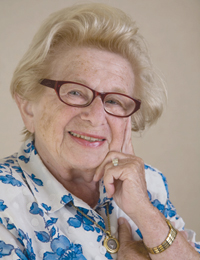Dr. Ruth Westheimer is world renowned for her work as a sex therapist, media personality and author. Best known as Dr. Ruth, The New York Times described her as a “Sorbonne-trained psychologist who became a kind of cultural icon in the 1980s. She ushered in the new age of freer, franker talk about sex on radio and television.” Who better to talk about the needs of the Alzheimer’s caregiver than Dr. Ruth in her trademark forthright and honest manner? Dr. Ruth sat down with Editor-in-Chief Gary Barg for a frank discussion about some of their issues. The wisdom shared by Dr. Ruth can be applied to all family caregivers everywhere. As she says, “A lesson taught with humor is a lesson retained.”
Gary Barg: I’m very happy that we get a chance to talk about your book, Dr. Ruth’s Guide for Alzheimer’s Caregivers. I knew I was going to like it when I started reading and the first chapter is titled, “How to Help Yourself.” Why do you think that’s specifically important for Alzheimer’s caregivers?
Dr. Ruth: I’ll tell you why – because it’s not like when somebody has an operation. There’s a hospital stay, then there’s recovery, and then people can go on with their life. That’s not the case here because this is such a horrible disease. And it’s such a hopeless disease. So I decided I know how to do training of professionals from my years at Planned Parenthood and I said that’s what I have to use right now. Just to tell people that they must – without feeling bad and without feeling guilty – they must do something for themselves.
Gary Barg: There’s a lovely segment in the book. You talk about scheduling happiness. How do we do that?
Dr. Ruth: We decide that there is a moment that we have to be selfish. You have an obligation to go out. You have an obligation to meet some friends, to go to a movie, to do something. You have to make arrangements to get some help and to go to the opera or to go to a concert. And then not to sit there guiltily, but to sit there and say, “This is for my survival. I can give better care when I have done something for myself.” That’s really what I’m talking about—the scheduling of happiness. When you don’t feel that you did something that took away from the care and then you come back, you are renewed.
Gary Barg: If you don’t care for yourself, how can you possibly care for the person who needs your help?
Dr. Ruth: Exactly.
Gary Barg: I know it’s something you don’t normally talk about, but let’s talk about sex.
Dr. Ruth: This is not a book about sex; but, of course, I had to say something. I know from people that I talk to – I’m thinking especially of one gentleman who said he can continue having sexual relations. This is not the problem. The problem is that the sick person doesn’t remember. And there are people who will not date somebody whose spouse is living with that disease. It just doesn’t work because they can’t date and put that reality on the side, and the caregiver would not get a divorce in this situation. And I know of some people who are in a care facility that start a relationship with somebody else.
Gary Barg: You spoke of Former Supreme Court Justice Sandra Day O’Connor’s husband who developed a committed relationship with a lady in the Alzheimer’s facility. This happened to my grandfather as well.
Dr. Ruth: It must have been devastating for your grandmother.
Gary Barg: She wasn’t well herself. She was being cared for somewhere else. And to my mom’s credit, she understood what was going on and she accepted the relationship because Gramps did. He adored his wife. He would never have done that if he had been aware. And we discovered that it’s really quite a contentious topic when we write about this. What advice do you have for family caregivers who find themselves with a loved one or a husband, wife, or parent, who is still married and has a relationship in a care facility?
Dr. Ruth: It is very difficult. I will never minimize the difficulty; but I give credit to all of those family members who accept it by saying, “That’s the situation.” It’s very difficult to then still be the caregiver and loving relative, even if a new partner enters. It’s very difficult to tell a spouse. Here you have lived with this person for 40 years and now that person doesn’t recognize you. It’s not just the sex. It’s the emotional part of not recognizing somebody that you have lived with for a lifetime. And I think one has to get over the conventional view. It’s not something that anybody would have done if they were not in that situation. So one has to say, at least in the facility, they can visit each other, they can hold hands, they can have sex. I also hope that they make sure that there’s no sexually transmitted disease.
Gary Barg: And I think you’re right. I think sometimes the thing that will hurt the cognitive spouse is the loss of emotional intimacy. They see their loved one, who isn’t the same person anymore, having a relationship with somebody else. How do you overcome that?
Dr. Ruth: Very difficult. You can’t overcome it because there is some resentment in saying, “Here I cared for you, here I’m visiting you, and I have had a life with you, I have had children with you and grandchildren.” Nobody will ever get over it. What I’m saying is you have to deal with it by saying, “That’s the reality of life right now for you.” Very difficult.
Gary Barg: You just have to accept that it makes somebody I love happy, although they would never have done that if they were aware, so I understand that.
Dr. Ruth: Absolutely. That’s a very important point. By being able to say that, it let’s somebody bear that disease with some happiness.
Gary Barg: You bring up another point and it’s the stereotype of who does and doesn’t get AIDS. Isn’t it true that seniors are one of the fastest growing populations contracting AIDS because they don’t think it will affect them.
Dr. Ruth: Because they think that nothing can happen to them and young people think that AIDS is not a problem anymore because there is medication. They have not seen what people like myself have—so many AIDS patients die. So they think they can have indiscriminate sex and nothing will happen. And in the case of the older population, nobody talks to them about sexually transmitted diseases—not just AIDS, but also herpes and other STDs, because they think, “That can’t happen to me at this stage in life.”
Gary Barg: We always say that the caregiver is the manager of services, the CEO of Caring for My Loved One, Inc. What advice do you have for the caregivers who now have to deal with doctors and care managers and therapists and in-home aides? How do you get them to maintain control of their loved one’s care team?
Dr. Ruth: First of all, not to be angry at the professionals. That’s my first advice. Not to get angry at the nurses and the physicians because it’s not their fault that they didn’t get training. Instead, take the initiative of talking about your issues.
Gary Barg: Right. Bring them the education they need to help you and your loved one.
Dr. Ruth: Exactly. Not easy. I don’t want ever to minimize the difficulty of saying, “We have to talk about this.”
Gary Barg: You have a chapter called “You Have a Life, Too.” What I love about that is the first step is to believe you are deserving of help. Why do I need to believe that?
Dr. Ruth: I say that so people who were married for 40 years shouldn’t feel bad now that they are getting help from an outside source. I know that these are feelings that could sabotage their own ability to continue with their life. If they walk around feeling guilty, the help they are getting is not useful. I can’t take away, and you can’t take away, any of those feelings of guilt; but you and I can say this is something that you in your work and that I with my acquaintances know is happening. So you are not alone.
Gary Barg: You’re not alone. And, guess what? You deserve that help, so ask for it.
Dr. Ruth: Put it this way. You have an obligation to ask for the help in order to be able to continue giving the care. Do you like that? Gary Barg: I really think it creates that professionalization of family. The first step is to believe that you deserve to get the help and the second step is not to isolate yourself. And it doesn’t have to do with you; it has to do with the role you play in the care of your loved one.
Dr. Ruth: Right. And then you have an obligation even to start new relationships. I’m not just talking about sex. I’m talking about just human relationships. You can’t just sit there.
Gary Barg: What would be your one most important piece of advice that you’d like to leave family caregivers with?
Dr. Ruth: I think the most important thing is not to feel guilty. It’s not your fault. It’s not anything that you have done. And then, take it from there. Because if you start to feel guilty that you should be home, that you should be the only caregiver, you are going to run out of steam. So if I would have to choose one thing, it’s that.
https://www.caregiver.com/articles/interviews/dr_ruth_interview.htm



